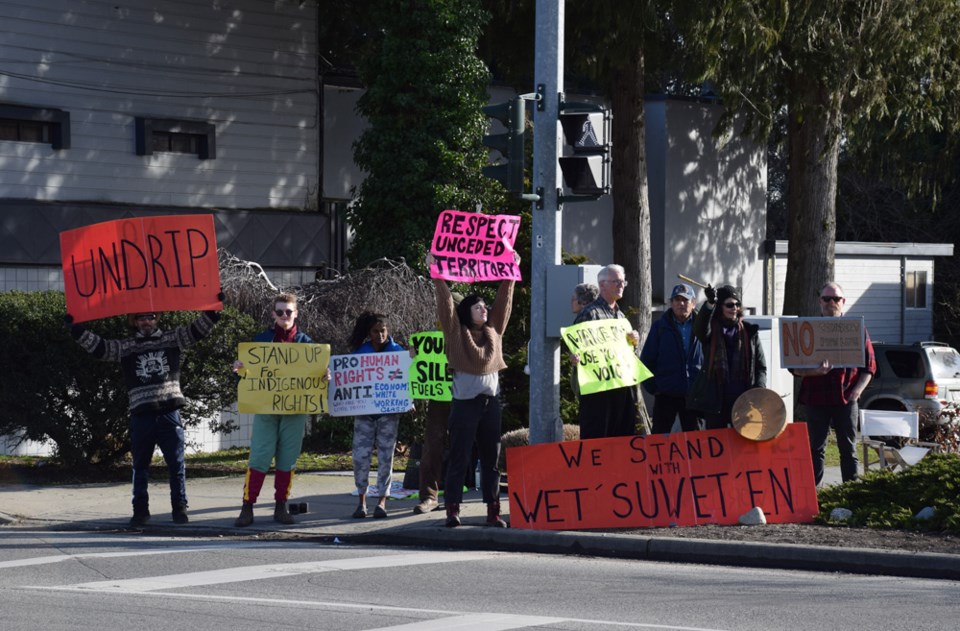Demonstrators who have been blocking roads and railways to show solidarity with Wet'suwet'en hereditary chiefs opposed to the Coastal Gaslink pipeline continued their actions this week, including an attempt to make a “citizen’s arrest” of premier John Horgan on Tuesday, just before the tabling of the provincial budget.
The Sunshine Coast has also seen ongoing demonstrations.
Several drivers honked in support of a group of about 20 demonstrators who gathered Feb. 14 at the intersection of Gibsons Way and Sunnycrest Road in Gibsons. The group also faced some abuse shouted from other passing vehicles.
The Gibsons demonstrations prompted a resolution from council brought forward at the Feb. 18 meeting by youth councillor Eilis Mackenzie, supported by Mayor Bill Beamish.
There was a large crowd in the council chamber to hear the resolution presented, but the text was changed from the version on the agenda published before the meeting.
A clause saying, “Whereas the Hereditary Chiefs of the Wet'suwet'en Nation have opposed development within their unceded traditional territory,” was replaced, leaving the final resolution to read:
“Whereas the Town of Gibsons Council supports the B.C. Declaration on the Rights of Indigenous Peoples Act;
“And whereas this Act affirms commitment to articles of the UN Declaration on the Rights of Indigenous Peoples, including the right to self-determination and to freely pursue economic, social and cultural development;
“And whereas the hereditary and elected legal authorities of both Canada and the Wet'suwet'en Nation have not yet followed UNDRIP and the B.C. Declaration on the Rights of Indigenous Peoples to establish Wet'suwet'en legal recognition and protections of their lands.
“Now therefore the council for the Town of Gibsons confirms its support for the legal recognition of the rights of Indigenous Peoples to determine the uses of land on their traditional territories, and encourages all parties to resolve disputes through negotiation based on mutual respect, recognition of rights and the rule of law.”
Mackenzie said she decided to bring the resolution forward after seeing youth in the community sharing “statements of solidarity for the people of Wet'suwet'en.”
“It’s really important to youth not only in our community but also all around the country – especially Indigenous youth,” Mackenzie said.
“Everyone wants to see a peaceful, respectful negotiation at the end of this, but right now we can’t sweep under the rug that the government is not respecting Indigenous people. They’re training guns on peaceful protesters, they’re sending militarized police forces into the Wet'suwet'en territory. That’s not OK and that can’t be ignored just by saying that we need mutual respect, because right now there isn’t mutual respect... That’s why this is on the table today.”
Beamish also noted the allegations the abuse shouted at protesters in Gibsons included racial slurs and threats aimed at one of the organizers. “I don’t accept that [behaviour] as typical of our community,” Beamish said. “As a community we must be vigilant and call out intolerance and discrimination in all its forms, wherever and whenever we encounter it.”
The motion passed unanimously and will be forwarded to the Sunshine Coast Regional District board, Sechelt council and the shíshálh and Squamish Nations.
West Vancouver-Sunshine Coast-Sea to Sky Country MP Patrick Weiler has also commented on the Wet'suwet'en situation.
In an interview for Eastlink Community TV’s Parliamentary Talkback program on Feb. 13, Weiler said the issue is a bit challenging from the federal perspective because the controversial project is within provincial jurisdiction.
“I know the provincial government is working hard to find solutions,” Weiler said.
“The Wet'suwet'en were the nation that brought forward the first case that established the idea of aboriginal title… This nation has about as strong a claim as you can imagine and it had been detailed through this entire court process.”
There is, however, still a role for the federal government, according to Weiler.
“When you have a division between the elected and hereditary leadership it causes complexity of all sorts,” he said. “I think there is a role for the federal government to work with the provincial government on how to reconcile this and how to assist the Wet'suwet'en on coming to conclusions on their own governance structures and a way forward.”
Weiler also said the government is watching the situation through the lens of the B.C. NDP government’s recently passed legislation on the UN Declaration of the Rights of Indigenous Peoples (UNDRIP).
The Trudeau government’s UNDRIP legislation was held up in the Senate before the last election, but is expected to be brought forward again.
“We get a chance to see what the experience has been for the provincial government and we can take some lessons from that and how we’re going to approach implementing that in the same way across the country,” Weiler said.
“It’s going to require really fundamental ways of rethinking not only policy but a lot of the legislation, existing and new. And so I think it will provide a lot of context and a lot of lessons learned about how we’re going to go about that.”



